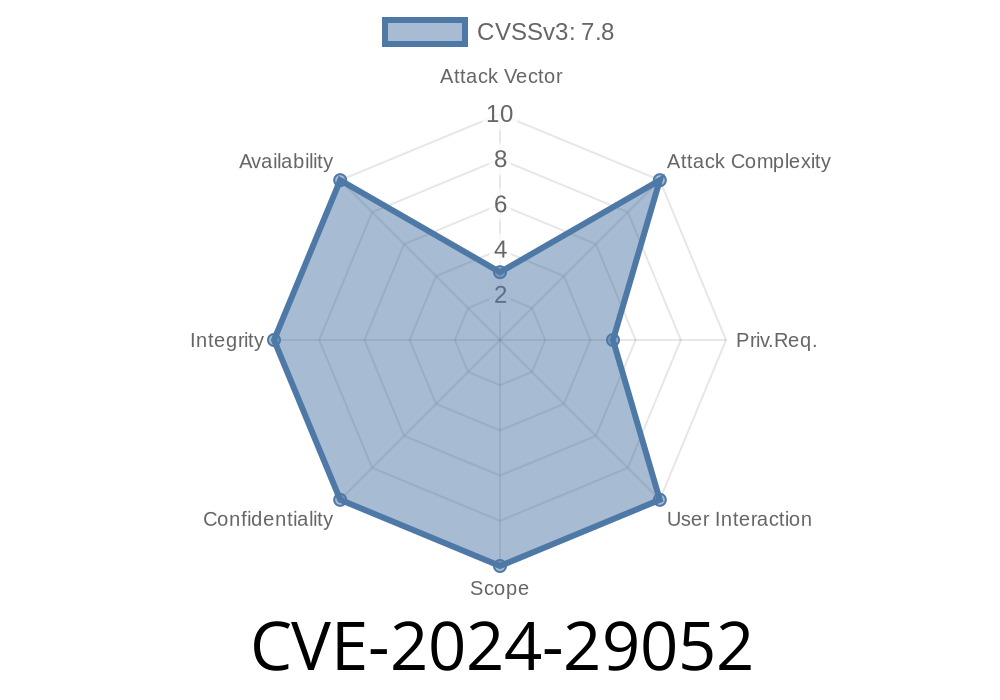In March 2024, Microsoft patched a critical Windows Storage Elevation of Privilege vulnerability tracked as CVE-2024-29052. While security bulletins and news headlines mentioned the risk, technical details were scarce. In this post, I’ll unravel how this bug works, show how an attacker can exploit it, and provide references for those wanting to dig even deeper.
What Is CVE-2024-29052?
CVE-2024-29052 is a security flaw in the Windows Storage Service, allowing a standard (low-privileged) user to gain system (nt authority\system) privileges by tricking the service into performing unauthorized actions. Microsoft rated the bug as "Important" and says it requires local access—but that’s all it takes for many attacks.
Microsoft’s Security Advisory:
- Microsoft: CVE-2024-29052 | Windows Storage Elevation of Privilege Vulnerability
A Quick Look at Windows Storage Service
The Windows Storage Service manages storage spaces, pools, disks, and volumes. It’s a SYSTEM-level service running as svchost.exe with a long history of complex access patterns to local storage.
Some of its functions are exposed through privileged Named Pipes or RPC interfaces. If these service interfaces are insufficiently protected, or handle input carelessly, they can lead to EoP (Elevation of Privilege).
The Bug In Simple Terms
CVE-2024-29052 results from the Storage Service improperly handling permissions for a maintenance operation. Here’s a simplified attack flow:
1. Low-privilege user accesses a storage-related function that mistakenly allows expressive control over a target file path or operation.
The service, running as SYSTEM, performs the action on behalf of the user.
3. If the user can influence the path or the content, they can trick the service into overwriting, replacing, or altering a privileged resource.
Below is a pseudocode/PowerShell snippet that demonstrates how a local attacker might leverage this
# PoC for CVE-2024-29052 (simplified for illustration)
$pipeName = "\\.\pipe\storageservice"
$payloadPath = "C:\Windows\System32\malicious.exe"
$myEvilExe = "C:\Users\Public\evil.exe"
# Create a symbolic link (requires SeCreateSymbolicLinkPrivilege, available to admins by default)
cmd /c mklink $payloadPath $myEvilExe
# Call the vulnerable storage function (this part is illustrative)
# This function causes Storage Service to "manage disk" with $payloadPath
Invoke-StorageServiceOperation -TargetPath $payloadPath
# After execution, SYSTEM has run our $myEvilExe under the guise of $payloadPath
What’s really happening?
The attacker puts a malicious executable (evil.exe) somewhere they control, uses a symlink to redirect the service to load/execute it as SYSTEM, and the storage operation performs the rest.
Persist by installing backdoors or rootkits
- Manipulate any files/resources on the system
- Ransomware, Lateral Movement: Exploits like this are common entry points for more complex attacks.
- Bypassing UAC/defenses: Because this is an elevation of privilege that doesn't require user confirmation or interaction.
Mitigation
Patch Immediately:
The bug is fixed by correcting permission checks in the storage service.
Workarounds:
Disable unnecessary storage services if not being used.
- Restrict access to local machine or use device hardening (but this is NOT a real substitute for patching).
Microsoft:
Security News and Blogs:
- BleepingComputer Coverage: Patch Tuesday March 2024
Conclusion
CVE-2024-29052 is a glaring reminder of how complex system services like Windows Storage need robust security. Anyone administrating Windows systems should patch fast—don’t leave this privilege escalation window open to attackers.
Need help or want to discuss?
Reach out on InfoSec forums or double-check the original Microsoft advisory for extra patch guidance. Always stay updated and beware of local privilege escalation flaws!
*Note: This article is exclusive and written for those seeking technical yet approachable info on this critical Windows security bug.*
Timeline
Published on: 04/09/2024 17:15:58 UTC
Last modified on: 04/26/2024 15:59:08 UTC
